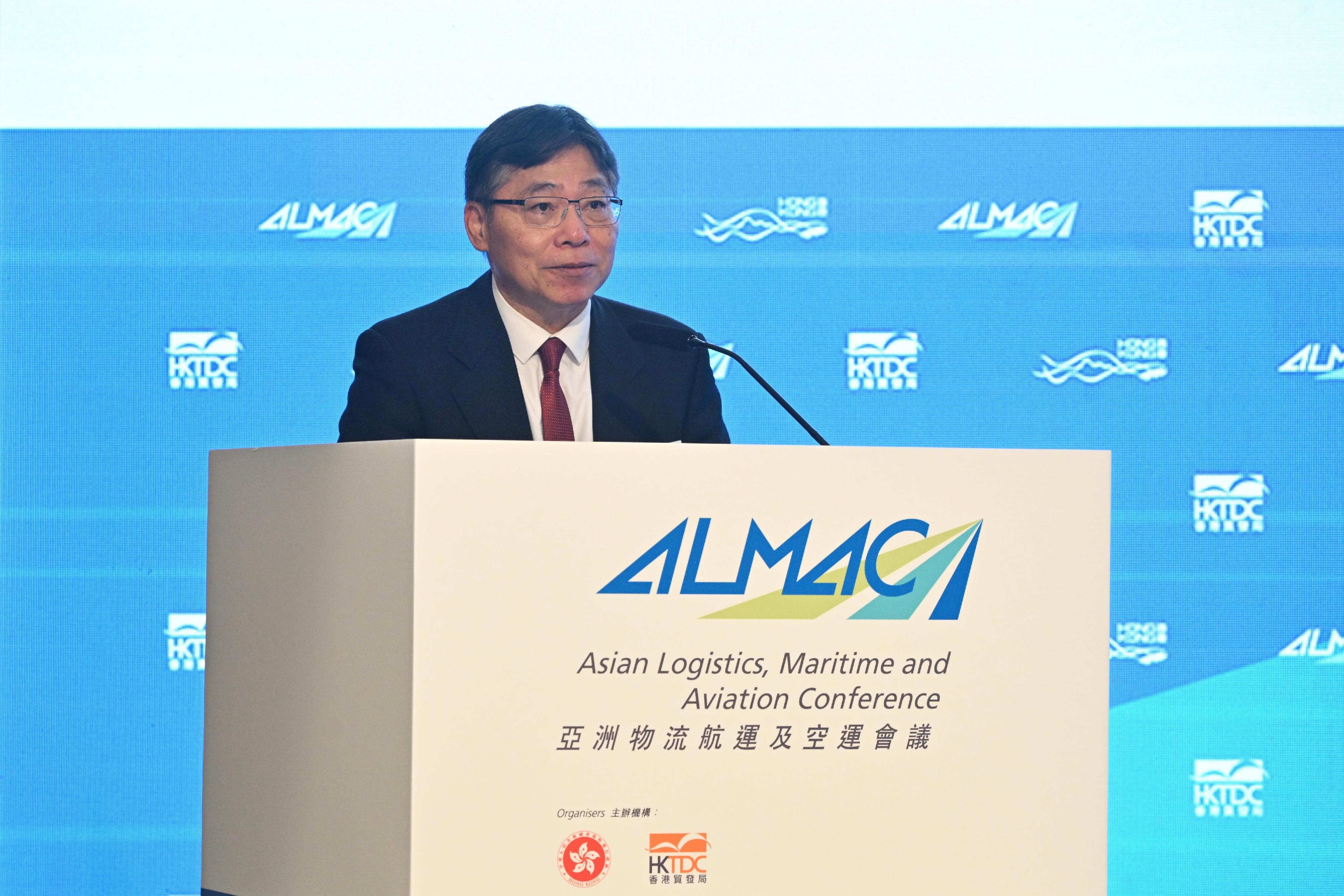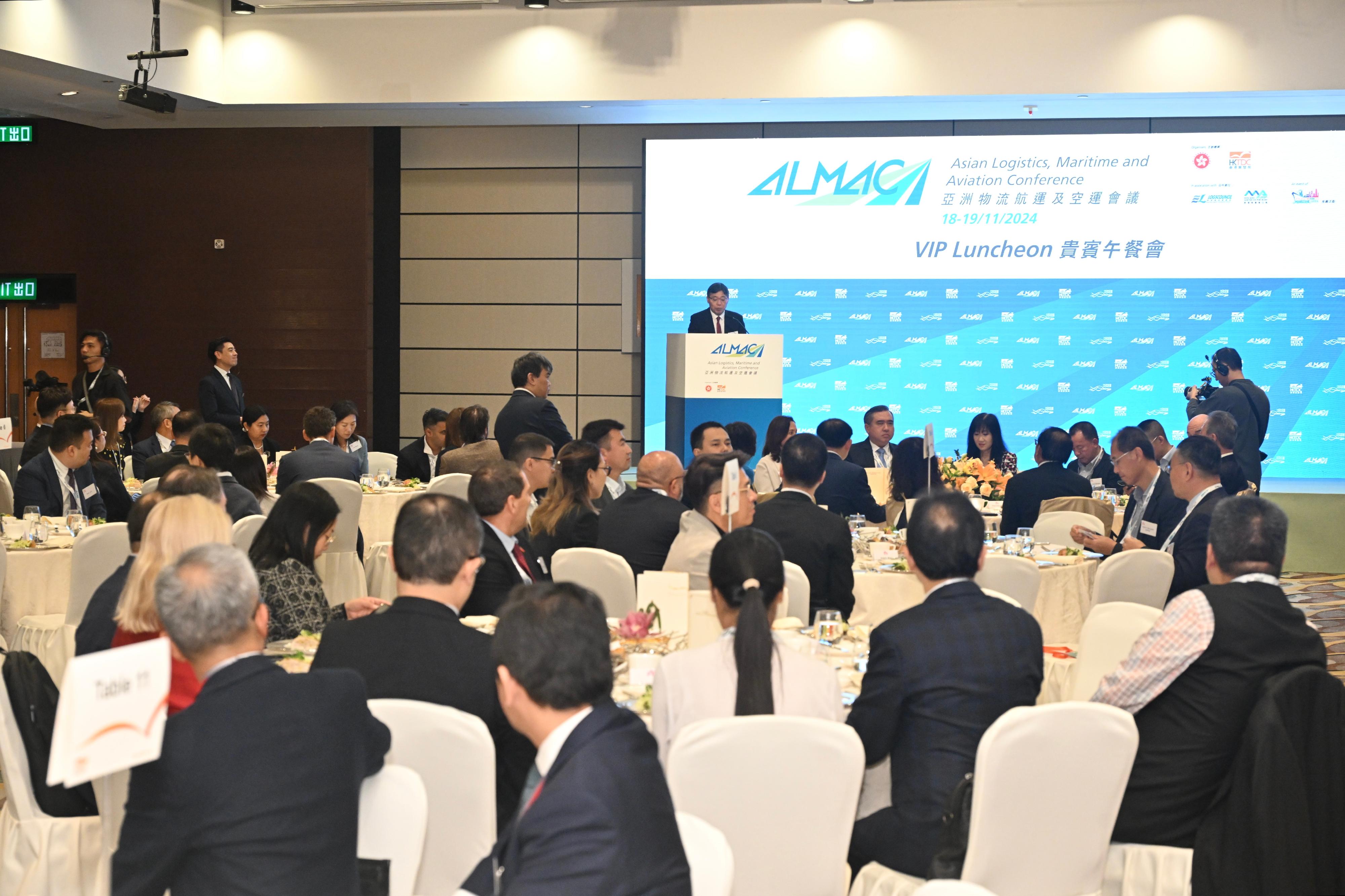Following is the speech by the Acting Chief Executive, Mr Chan Kwok-ki, at the Opening Ceremony of Hong Kong Maritime Week 2024 cum World Maritime Merchants Forum 2024 today (November 18):
Honourable Vice-Chairman C Y Leung (Vice-Chairman of the National Committee of the Chinese People's Political Consultative Conference), Director Zheng Yanxiong (Director of the Liaison Office of the Central People's Government in the Hong Kong Special Administrative Region (HKSAR)), Commissioner Cui Jianchun (Commissioner of the Ministry of Foreign Affairs of the People's Republic of China in the HKSAR), Vice Minister Fu Xuyin (Vice Minister of Transport), Chairman Miao Jianmin (Chairman of the China Merchants Group), distinguished guests, friends of the global maritime community, ladies and gentlemen,
Good afternoon. A very warm welcome to Hong Kong Maritime Week and the World Maritime Merchants Forum, which gets going, right here, immediately after our opening ceremony.
This is the eighth edition of Maritime Week, and I am delighted to say it is expected to draw some 14 500 professionals from all over the world.
The theme of this year's Maritime Week, "Navigating to a Greener Future", is a clear and compelling statement of our commitment to sustainability.
Throughout this week, you will want to take in some of the many seminars, workshops and related events spotlighting sustainability and our industry. That includes the Asian Logistics, Maritime and Aviation Conference, which opened this morning. And there is lots more on offer, from harbour and terminal tours and the Golf Cup, to lunches and networking cocktails, games, competitions and a diverse array of international, regional and local happenings. It is all part of Maritime Week 2024.
So is the World Maritime Merchants Forum, the fourth edition.
Indeed, the Forum has become a signature event promoting the global shipping industry chain.
This year's Forum tackles such critical topics as the role of ship finance in industrial transformation, the implications of new carbon-tax regulations and the transformative potential of artificial intelligence in driving digital change in shipping.
Our strategic location as a gateway to Asia, together with our sophisticated facilities and infrastructure, has been central to Hong Kong's rise as one of the world's busiest and most efficient ports.
In the latest International Shipping Centre Development Index, Hong Kong ranked fourth, overall, boasting more than 300 weekly international container-vessel sailings to nearly 500 destinations.
The average length of stay of container vessels in Hong Kong port is 0.95 days. That is about half the average of 1.85 days for the world's top 20 container ports. Our efficiency, I am pleased to say, has earned us the reputation of being a "catch-up port".
And our unique institutional strengths under "one country, two systems", together with our common law system, make Hong Kong an ideal hub for high-value-added maritime services.
We are determined to build on our maritime strengths, as the 2024 Policy Address, published last month, underlined.
Maritime initiatives outlined in the Policy Address include the establishment of the Hong Kong Maritime and Port Development Board. The high-level advisory body will assist the Government in developing policy and long-term strategy for the maritime sector.
The board will include representatives from the maritime industry, ensuring that our policies are informed by those who understand the industry best.
We will also promote the development of high-value-added maritime and professional services by encouraging shipping principals and maritime enterprises to establish a presence or expand in Hong Kong.
That means promoting the tax exemptions we introduced in the past few years for ship-leasing businesses and half-rate tax concessions for marine insurance, ship management, ship agency and ship broking. We will also look to enhance these concessions to ensure that they remain internationally attractive.
And we will explore tax measures to encourage commodity traders to look to Hong Kong for their future.
Talent is also critical to our future success. We will continue to invest in maritime service talent development, strengthening our collaboration with international marine insurance organisations. We will also expand the Maritime and Aviation Training Fund to cover more green energy courses and marine insurance examinations.
Sustainability – transforming Hong Kong into a green maritime centre – is at the heart of our policy priorities.
Earlier this year, our Marine Department began offering cash incentives for Hong Kong-registered ships that meet international decarbonisation standards. We will expand our promotion of this initiative, encouraging more ships to participate.
Our ambitions also include developing Hong Kong into a green maritime fuel-bunkering centre. Just a few days ago, we published our Action Plan on Green Maritime Fuel Bunkering. Our efforts include the development of essential infrastructure, promoting reduced port emissions, and providing incentives for the use of green maritime fuels. No less important, the Action Plan emphasises collaboration with Greater Bay Area ports and working to create green shipping corridors with other ports.
In short, it will fast track our progress as a green maritime centre.
Ladies and gentlemen, I wish you the best of business and pleasure at Maritime Week, a productive World Maritime Merchants Forum and smooth sailing in the coming year, whatever your course or destination.
Thank you.

